阅读理解记叙文总复习经典例题、习题经典
(语文)语文记叙文阅读专题训练练习题20篇含解析
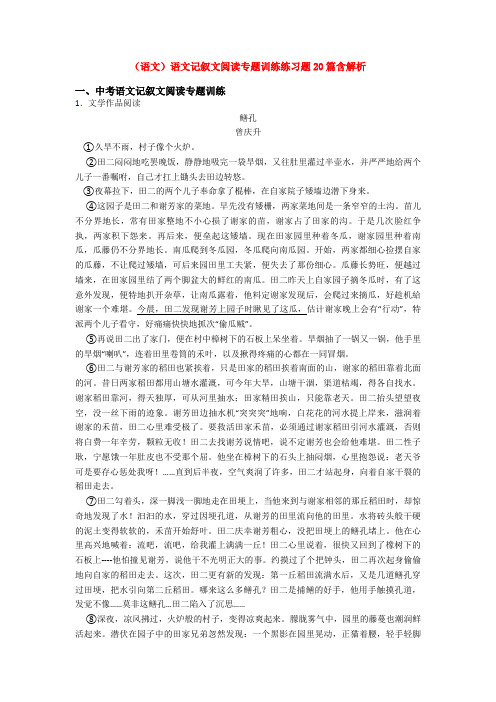
(语文)语文记叙文阅读专题训练练习题20篇含解析一、中考语文记叙文阅读专题训练1.文学作品阅读鳝孔曾庆升①久旱不雨,村子像个火炉。
②田二闷闷地吃罢晚饭,静静地吸完一袋旱烟,又往肚里灌过半壶水,并严严地给两个儿子一番嘱咐,自己才扛上锄头去田边转悠。
③夜幕拉下,田二的两个儿子奉命拿了棍棒,在自家院子矮墙边潜下身来。
④这园子是田二和谢芳家的菜地。
早先没有矮栅,两家菜地间是一条窄窄的土沟。
苗儿不分界地长,常有田家整地不小心损了谢家的苗,谢家占了田家的沟。
于是几次脸红争执,两家积下怨来。
再后来,便垒起这矮墙。
现在田家园里种着冬瓜,谢家园里种着南瓜,瓜藤仍不分界地长。
南瓜爬到冬瓜园,冬瓜爬向南瓜园。
开始,两家都细心捡摆自家的瓜藤,不让爬过矮墙,可后来园田里工夫紧,便失去了那份细心。
瓜藤长势旺,便越过墙来,在田家园里结了两个脚盆大的鲜红的南瓜。
田二昨天上自家园子摘冬瓜时,有了这意外发现,便特地扒开杂草,让南瓜露着,他料定谢家发现后,会爬过来摘瓜,好趁机給谢家一个难堪。
今晨,田二发现谢芳上园子时瞅见了这瓜,估计谢家晚上会有“行动”,特派两个儿子看守,好痛痛快快地抓次“偷瓜贼”。
⑤再说田二出了家门,便在村中樟树下的石板上呆坐着。
旱烟抽了一锅又一锅,他手里的旱烟“喇叭”,连着田里卷筒的禾叶,以及揪得疼痛的心都在一同冒烟。
⑥田二与谢芳家的稻田也紧挨着,只是田家的稻田挨着南面的山,谢家的稻田靠着北面的河。
昔日两家稻田都用山塘水灌溉,可今年大旱,山塘干涸,渠道枯竭,得各自找水。
谢家稻田靠河,得天独厚,可从河里抽水;田家精田挨山,只能靠老天。
田二抬头望望夜空,没一丝下雨的迹象。
谢芳田边抽水机“突突突”地响,白花花的河水提上岸来,滋润着谢家的禾苗,田二心里难受极了。
要救活田家禾苗,必须通过谢家稻田引河水灌溉,否则将白费一年辛劳,颗粒无收!田二去找谢芳说情吧,说不定谢芳也会给他难堪。
田二性子耿,宁愿饿一年肚皮也不受那个屈。
他坐在樟树下的石头上抽闷烟,心里抱怨说:老天爷可是要存心惩处我呀!……直到后半夜,空气爽润了许多,田二才站起身,向着自家干裂的稻田走去。
2020-2021年阅读理解记叙文总复习经典例题、习题(word)1
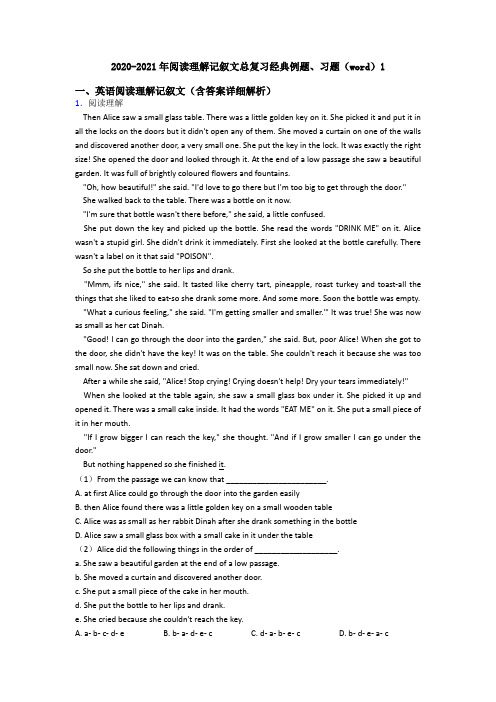
2020-2021年阅读理解记叙文总复习经典例题、习题(word)1一、英语阅读理解记叙文(含答案详细解析)1.阅读理解Then Alice saw a small glass table. There was a little golden key on it. She picked it and put it in all the locks on the doors but it didn't open any of them. She moved a curtain on one of the walls and discovered another door, a very small one. She put the key in the lock. It was exactly the right size! She opened the door and looked through it. At the end of a low passage she saw a beautiful garden. It was full of brightly coloured flowers and fountains."Oh, how beautiful!" she said. "I'd love to go there but I'm too big to get through the door."She walked back to the table. There was a bottle on it now."I'm sure that bottle wasn't there before," she said, a little confused.She put down the key and picked up the bottle. She read the words "DRINK ME" on it. Alice wasn't a stupid girl. She didn't drink it immediately. First she looked at the bottle carefully. There wasn't a label on it that said "POISON".So she put the bottle to her lips and drank."Mmm, ifs nice," she said. It tasted like cherry tart, pineapple, roast turkey and toast-all the things that she liked to eat-so she drank some more. And some more. Soon the bottle was empty. "What a curious feeling," she said. "I'm getting smaller and smaller.'" It was true! She was now as small as her cat Dinah."Good! I can go through the door into the garden," she said. But, poor Alice! When she got to the door, she didn't have the key! It was on the table. She couldn't reach it because she was too small now. She sat down and cried.After a while she said, "Alice! Stop crying! Crying doesn't help! Dry your tears immediately!"When she looked at the table again, she saw a small glass box under it. She picked it up and opened it. There was a small cake inside. It had the words "EAT ME" on it. She put a small piece of it in her mouth."If I grow bigger I can reach the key," she thought. "And if I grow smaller I can go under the door."But nothing happened so she finished it.(1)From the passage we can know that _______________________.A. at first Alice could go through the door into the garden easilyB. then Alice found there was a little golden key on a small wooden tableC. Alice was as small as her rabbit Dinah after she drank something in the bottleD. Alice saw a small glass box with a small cake in it under the table(2)Alice did the following things in the order of ___________________.a. She saw a beautiful garden at the end of a low passage.b. She moved a curtain and discovered another door.c. She put a small piece of the cake in her mouth.d. She put the bottle to her lips and drank.e. She cried because she couldn't reach the key.A. a- b- c- d- eB. b- a- d- e- cC. d- a- b- e- cD. b- d- e- a- c(3)The underlined word "it" in the last paragraph refers to ______________.A. the small boxB. the glass tableC. the small cakeD. the golden key(4)According to the passage, the best words to describe Alice are ___________________.A. careful and braveB. curious and helpfulC. clever and friendlyD. organized and strange【答案】(1)D(2)B(3)C(4)A【解析】【分析】文章大意:本文主要讲爱丽丝被关到一座房子里,但出不去,里面有一些东西可以使她变小。
初中语文中考总复习——记叙文阅读理解专题训练1-100篇(含答案解析)

⑭故乡的风,依然在四季里行走,从未停歇,但它已失去身披黄色的凶猛。穿过绿树荫荫,送来阵阵洁净的清爽,露出透明的形态。记忆中和现实中,故乡的风究竟形态如何,又会带来怎样的回味和感受,也许,只有故乡人知道……
⑤我的冷血是存心的,因为我对父亲有着深深的不满。父亲原来是一名工人,45岁那年他病退回家,让与我同班读书的大哥辍学“顶替”。大哥比我大一岁,我俩的成绩不相上下,都是班上的尖子生。可那时家里穷,父亲怕我俩都考上又都读不“终局”,于是决定让大哥回来“顶替”。
⑥就这样,我和大哥开始了不同的人生。大哥进厂不久,厂里更新了机器设备,他的工作只是坐在电脑监控室里按电钮,轻松自在,养得白白胖胖,并按部就班地娶了妻,生了子,节假日一家三口共用一辆摩托车,像一串幸福的糖葫芦在大街小巷兜风,活得好不滋润。而我这个世纪末的大学生却赶上不包分配,在一个又一个人才市场里兜售了两年,赔尽了笑脸,仍然没能把自己推销出去,个中辛酸,一言难尽。正是我们兄弟俩截然不同的生活境况让我开始憎恨父亲,他明知我自幼体弱多病,为什么不保险起见让我“顶替”呢?既然父亲把他的爱以最实惠的方式给了大哥一个人,那么就让大哥一个人来承担养老送终的义务吧!我虽然冷血却不矫情,言为心声是我最大的优点。所以我说要回家睡觉。
阅读下面的散文,完成下列小题。
故乡的风
杨俊文
①锦州风大。
②童年记忆里的风,有时在耳际嘶鸣,双眼便旋即做出眯起的样子,像是担心那风里的尘沙,还会吹进我的眼里。我知道这是瞬间的幻觉。
③最初,我对风的色彩的识别是黄色。其实,风不该有颜色,即使有,也是人的赋予,比如,风从海洋上吹过,说风是蓝色;从森林吹过,就是绿色;从雪山上吹过,就变成了白色。而家乡的风,与其它地方的风明显不同——它个性十足,生猛异常。那时,还没听过“沙尘暴”这个词,只知道“刮黄天儿”,风刮起,天空一片昏黄。
阅读理解记叙文总复习经典例题、习题

阅读理解记叙文总复习经典例题、习题一、英语阅读理解记叙文(含答案详细解析)1.根据短文内容,选择最佳答案。
Jackie visited his grandparents on their farm. And he was playing with a slingshot(弹弓) in the woods. He practised in the woods but he could never hit the target. As he was walking back, he saw Grandma's pet duck. Without thinking, he shot, hit the duck in the head and killed it. He was very afraid. He knew Grandma loved the duck. She would be sad or even angry if she knew that her duck was killed He then hid the dead duck under a tee His sister Susan saw it all, but she said nothing.After lunch that day Grandma said, "Susan, let's wash the dishes. "But Susan said, "Grandma. Jackie told me he wanted to help in the kitchen today, didn't you, Jackie?" And then she whispered(小声说) to him, "Remember the duck? "So Jackie did the dishes.Later Grandpa asked if the children wanted to go fishing, but Grandma sad, "Tm sorry but I need Susan to help clean the house." But Susan smiled and said, "Well, that's all right because Jackie told me he wanted to help."And she whispered again, "Remember the duck?" So Susan went fishing with Grandpa and Jackie stayed.These "remember the duck" went on for many days. Then finally Jackie couldn't stand it any longer. He came to Grandma and told her that he had killed the duck. She gave him a hug, and said, "Sweetheart, I know. You see, I was standing at the window and I saw the whole thing. But because I love you, I forgave you. But I just wanted to see how long you would let Susan make a slave(奴隶) of you."(1)What's probably the meaning of the word "target" in this passage?A. 树干B. 地面C. 动物D. 目标(2)What did Jackie hit with the slingshot at last?A. The targetB. A rabbitC. The pet duckD. A pet dog(3)Susan didn't tell Grandma about Jackie's secret becauseA. she wanted Jackie to do something for herB. she was afraid Grandma would be very sadC. she didn't want to make Grandma angryD. she loved her brother very much(4)Jackie helped clean the house instead of going fishing with Grandma becauseA. he liked cleaning the houseB. Grandma asked him to clean the houseC. he didn't like going fishingD. he wanted Susan to keep his secret(5)What can you learn from the passage?A. It's dangerous to play with a slingshot on a farm.B. It's impossible to let girls keep secrets for you.C. It makes you feel better to tell than to hide.D. It's dangerous to let others see what you've done.【答案】(1)D(2)C(3)A(4)D(5)C【解析】【分析】本文主要讲了Jackie不小心把祖母的宠物鸭用弹弓打死了,他不敢说,但是妹妹看到后一直要挟他,最后他告诉了祖母实情。
2020-2021年阅读理解记叙文总复习经典例题、习题经典1
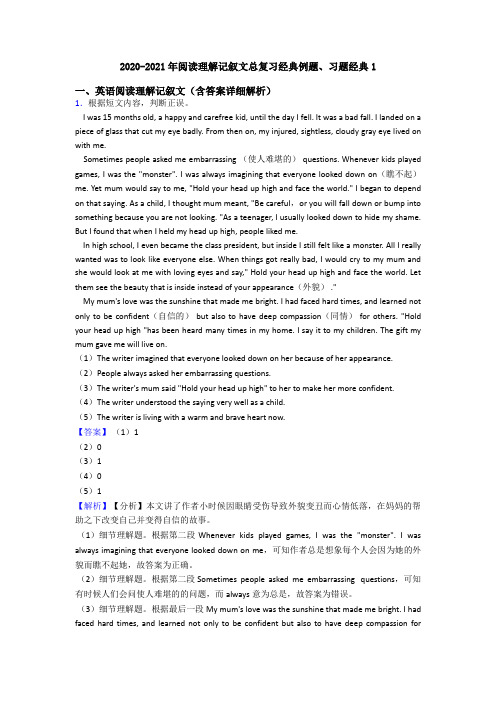
2020-2021年阅读理解记叙文总复习经典例题、习题经典1一、英语阅读理解记叙文(含答案详细解析)1.根据短文内容,判断正误。
I was 15 months old, a happy and carefree kid, until the day I fell. It was a bad fall. I landed on a piece of glass that cut my eye badly. From then on, my injured, sightless, cloudy gray eye lived on with me.Sometimes people asked me embarrassing (使人难堪的) questions. Whenever kids played games, I was the "monster". I was always imagining that everyone looked down on(瞧不起)me. Yet mum would say to me, "Hold your head up high and face the world." I began to depend on that saying. As a child, I thought mum meant, "Be careful,or you will fall down or bump into something because you are not looking. "As a teenager, I usually looked down to hide my shame. But I found that when I held my head up high, people liked me.In high school, I even became the class president, but inside I still felt like a monster. All I really wanted was to look like everyone else. When things got really bad, I would cry to my mum and she would look at me with loving eyes and say," Hold your head up high and face the world. Let them see the beauty that is inside instead of your appearance(外貌) ."My mum's love was the sunshine that made me bright. I had faced hard times, and learned not only to be confident(自信的) but also to have deep compassion(同情) for others. "Hold your head up high "has been heard many times in my home. I say it to my children. The gift my mum gave me will live on.(1)The writer imagined that everyone looked down on her because of her appearance. (2)People always asked her embarrassing questions.(3)The writer's mum said "Hold your head up high" to her to make her more confident. (4)The writer understood the saying very well as a child.(5)The writer is living with a warm and brave heart now.【答案】(1)1(2)0(3)1(4)0(5)1【解析】【分析】本文讲了作者小时候因眼睛受伤导致外貌变丑而心情低落,在妈妈的帮助之下改变自己并变得自信的故事。
初中语文记叙文阅读专题训练题20套(带答案)含解析
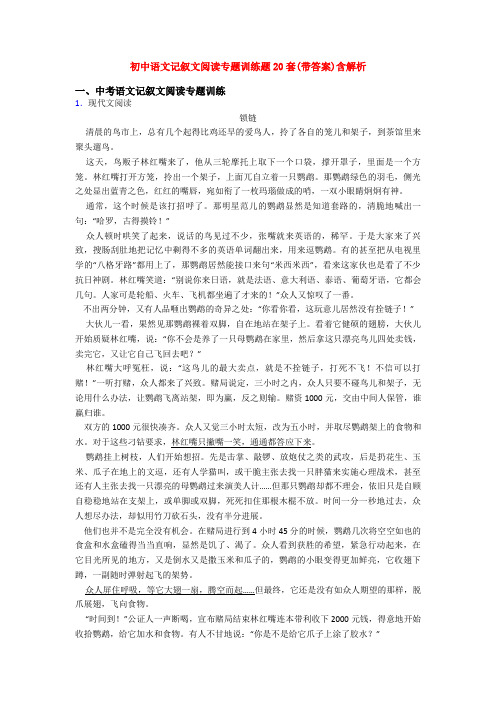
初中语文记叙文阅读专题训练题20套(带答案)含解析一、中考语文记叙文阅读专题训练1.现代文阅读锁链清晨的鸟市上,总有几个起得比鸡还早的爱鸟人,拎了各自的笼儿和架子,到茶馆里来聚头遛鸟。
这天,鸟贩子林红嘴来了,他从三轮摩托上取下一个口袋,撑开罩子,里面是一个方笼。
林红嘴打开方笼,拎出一个架子,上面兀自立着一只鹦鹉。
那鹦鹉绿色的羽毛,侧光之处显出蓝青之色,红红的嘴唇,宛如衔了一枚玛瑙做成的哨,一双小眼睛炯炯有神。
通常,这个时候是该打招呼了。
那明星范儿的鹦鹉显然是知道套路的,清脆地喊出一句:“哈罗,古得摸铃!”众人顿时哄笑了起来,说话的鸟见过不少,张嘴就来英语的,稀罕。
于是大家来了兴致,搜肠刮肚地把记忆中剩得不多的英语单词翻出来,用来逗鹦鹉。
有的甚至把从电视里学的“八格牙路”都用上了,那鹦鹉居然能接口来句“米西米西”,看来这家伙也是看了不少抗日神剧。
林红嘴笑道:“别说你来日语,就是法语、意大利语、泰语、葡萄牙语,它都会几句。
人家可是轮船、火车、飞机都坐遍了才来的!”众人又惊叹了一番。
不出两分钟,又有人品咂出鹦鹉的奇异之处:“你看你看,这玩意儿居然没有拴链子!”大伙儿一看,果然见那鹦鹉裸着双脚,自在地站在架子上。
看着它健硕的翅膀,大伙儿开始质疑林红嘴,说:“你不会是养了一只母鹦鹉在家里,然后拿这只漂亮鸟儿四处卖钱,卖完它,又让它自己飞回去吧?”林红嘴大呼冤枉,说:“这鸟儿的最大卖点,就是不拴链子,打死不飞!不信可以打赌!”一听打赌,众人都来了兴致。
赌局说定,三小时之内,众人只要不碰鸟儿和架子,无论用什么办法,让鹦鹉飞离站架,即为赢,反之则输。
赌资1000元,交由中间人保管,谁赢归谁。
双方的1000元很快凑齐。
众人又觉三小时太短,改为五小时,并取尽鹦鹉架上的食物和水。
对于这些刁钻要求,林红嘴只撇嘴一笑,通通都答应下来。
鹦鹉挂上树枝,人们开始想招。
先是击掌、敲锣、放炮仗之类的武攻,后是扔花生、玉米、瓜子在地上的文逗,还有人学猫叫,或干脆主张去找一只胖猫来实施心理战术,甚至还有人主张去找一只漂亮的母鹦鹉过来演美人计……但那只鹦鹉却都不理会,依旧只是自顾自稳稳地站在支架上,或单脚或双脚,死死扣住那根木棍不放。
中考语文记叙文阅读必做7篇典型题(含答案和解析)
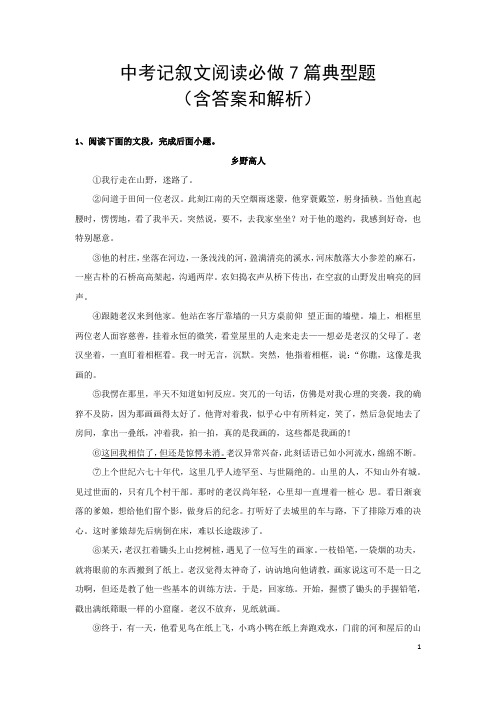
中考记叙文阅读必做7篇典型题(含答案和解析)1、阅读下面的文段,完成后面小题。
乡野高人①我行走在山野,迷路了。
②问道于田间一位老汉。
此刻江南的天空烟雨迷蒙,他穿蓑戴笠,躬身插秧。
当他直起腰时,愣愣地,看了我半天。
突然说,要不,去我家坐坐?对于他的邀约,我感到好奇,也特别愿意。
③他的村庄,坐落在河边,一条浅浅的河,盈满清亮的溪水,河床散落大小参差的麻石,一座古朴的石桥高高架起,沟通两岸。
农妇捣衣声从桥下传出,在空寂的山野发出响亮的回声。
④跟随老汉来到他家。
他站在客厅靠墙的一只方桌前仰望正面的墙壁。
墙上,相框里两位老人面容慈善,挂着永恒的微笑,看堂屋里的人走来走去——想必是老汉的父母了。
老汉坐着,一直盯着相框看。
我一时无言,沉默。
突然,他指着相框,说:“你瞧,这像是我画的。
⑤我愣在那里,半天不知道如何反应。
突兀的一句话,仿佛是对我心理的突袭,我的确猝不及防,因为那画画得太好了。
他背对着我,似乎心中有所料定,笑了,然后急促地去了房间,拿出一叠纸,冲着我,拍一拍,真的是我画的,这些都是我画的!⑥这回我相信了,但还是惊愕未消。
老汉异常兴奋,此刻话语已如小河流水,绵绵不断。
⑦上个世纪六七十年代,这里几乎人迹罕至、与世隔绝的。
山里的人,不知山外有城。
见过世面的,只有几个村干部。
那时的老汉尚年轻,心里却一直埋着一桩心思。
看日渐衰落的爹娘,想给他们留个影,做身后的纪念。
打听好了去城里的车与路,下了排除万难的决心。
这时爹娘却先后病倒在床,难以长途跋涉了。
⑧某天,老汉扛着锄头上山挖树桩,遇见了一位写生的画家。
一枝铅笔,一袋烟的功夫,就将眼前的东西搬到了纸上。
老汉觉得太神奇了,讷讷地向他请教,画家说这可不是一日之功啊,但还是教了他一些基本的训练方法。
于是,回家练。
开始,握惯了锄头的手握铅笔,戳出满纸筛眼一样的小窟窿。
老汉不放弃,见纸就画。
⑨终于,有一天,他看见鸟在纸上飞,小鸡小鸭在纸上奔跑戏水,门前的河和屋后的山都在纸上安妥了。
期末复习记叙文阅读训练-2024-2025学年六年级语文上册(统编版)
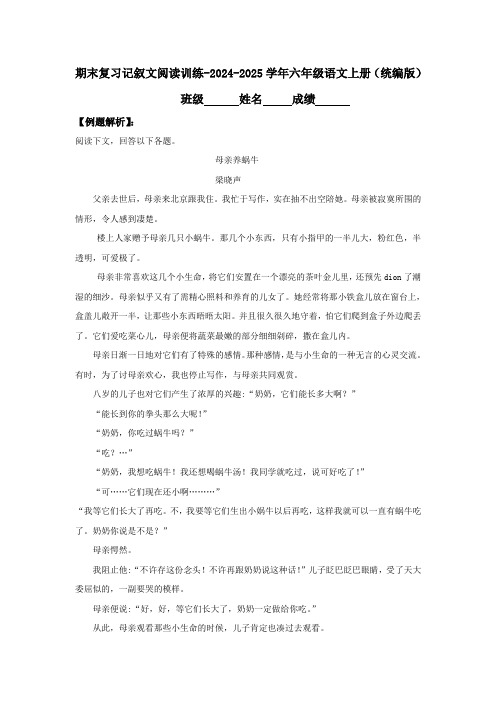
期末复习记叙文阅读训练-2024-2025学年六年级语文上册(统编版)班级姓名成绩【例题解析】:阅读下文,回答以下各题。
母亲养蜗牛梁晓声父亲去世后,母亲来北京跟我住。
我忙于写作,实在抽不出空陪她。
母亲被寂寞所围的情形,令人感到凄楚。
楼上人家赠予母亲几只小蜗牛。
那几个小东西,只有小指甲的一半儿大,粉红色,半透明,可爱极了。
母亲非常喜欢这几个小生命,将它们安置在一个漂亮的茶叶金儿里,还预先dion了潮湿的细沙。
母亲似乎又有了需精心照料和养育的儿女了。
她经常将那小铁盒儿放在窗台上,盒盖儿敞开一半,让那些小东西晤晤太阳。
并且很久很久地守着,怕它们爬到盒子外边爬丢了。
它们爱吃菜心儿,母亲便将蔬菜最嫩的部分细细剁碎,撒在盒儿内。
母亲日渐一日地对它们有了特殊的感情。
那种感情,是与小生命的一种无言的心灵交流。
有时,为了讨母亲欢心,我也停止写作,与母亲共同观赏。
八岁的儿子也对它们产生了浓厚的兴趣:“奶奶,它们能长多大啊?”“能长到你的拳头那么大呢!”“奶奶,你吃过蜗牛吗?”“吃?…”“奶奶,我想吃蜗牛!我还想喝蜗牛汤!我同学就吃过,说可好吃了!”“可……它们现在还小啊………”“我等它们长大了再吃。
不,我要等它们生出小娲牛以后再吃,这样我就可以一直有蜗牛吃了。
奶奶你说是不是?”母亲愕然。
我阻止他:“不许存这份念头!不许再跟奶奶说这种话!”儿子眨巴眨巴眼睛,受了天大委屈似的,一副要哭的模样。
母亲便说:“好,好,等它们长大了,奶奶一定做给你吃。
”从此,母亲观看那些小生命的时候,儿子肯定也凑过去观看。
先是,儿子问它们为什么还没长大,而母亲肯定地回答--它们分明已经长大了。
后来是,儿子确定地说。
它们已经长大了,不是长大了一些,而是长大了许多。
而母亲总是摇头-一根本就没长。
然而,不管母亲和儿子怎么想,怎么说,那些小生命的确是一天天长大着。
壳儿开始变黑变硬了,它们的头和柔软的身躯,从背着的“房屋”内探出时,憨态可掬,很有妙趣了。
2023年中考语文一轮复习:记叙文阅读 练习题汇编(含答案解析)

2023年中考语文一轮复习:记叙文阅读练习题汇编阅读散文《到古镇去看古》,完成下面小题。
到古镇去看古丁立梅①东淘古镇真的很古,始建于唐开元元年。
至清嘉庆年间,这里已有灶户19694家、灶丁48413名。
傍镇有南北贯通的串场河,河面上整天船只穿梭、舟帆楫影。
去时运盐,回时黄石板压舱。
一日一日,那带回的黄石板,竟在镇上铺出一条七里长街。
有街,人烟必旺。
于是,一家一家的店铺林立起来,连成一片,连成黛青的丛林。
②我在一个冬日的黄昏,走进古镇,一个人。
商店的音响里,放着时下流行的歌曲。
卖水果的摊儿,恨不得摆到街中央,橙黄的是枯和橘,青中带红的是苹果。
我绕过那水果摊,去寻七里长街。
问街上走着的一个人,知道七里长街吗?他纳闷地看着我,笑问,哪里有?③亦笑。
真的呢,历史走了这么久这么远,好多的痕迹,早已被风吹雨打去,哪里可寻?但到底还是留了痕迹。
黛青的房,在小巷里;明清时的建筑呢,门板已风化成紫黑,门板上的铜锁扣,锈迹深重。
轻抚,感觉手底下,有历史的风猎猎吹过。
我与谁的手印重叠了?谁又曾在这个门里,笑望月升日落?不可知了。
抬头,那乌青的屋脊上,长一蓬狗尾草,在这个冬日的黄昏里,它们很深沉地沉默着,仿佛也是一段历史。
④小巷静。
有的房内,已不住人了。
有的房内还住着人。
天色渐暗,老房子里的光线,便彻底地暗下来。
探头过去,需要静等几分钟,方能隐约看见屋内的人和物什。
有剃头师傅,还使着老式的剃须刀,不紧不慢地在给一个顾客弟着头发。
剃头师傅很老了,顾客亦很老了,他们的身影,隐在一段幽暗里,是一段旧时光。
没有什么声音可以打扰他们,他们在旧时光里,安详。
⑤再有一间房,房内摆满布鞋,一个老人,正抽拉着鞋线——他在做布鞋。
我想起那些年月,母亲在煤油灯下纳鞋底,白棉线抽得“哧、哧、哧”的,冬天的深夜,因此有了温度。
沿着黄石板铺成的街道,慢慢走,我想,在上面,不知走过多少双布鞋呢,不知走过多少母亲的牵挂和疼爱。
富商也好,盐民也罢,总有一个母亲,在为他祈愿,岁岁平安。
记叙类文本阅读理解练习题(附答案)

记叙类文本阅读理解练习典例分析:(一)父爱昼夜无眠父亲最近总是萎靡不振,大白天躺在床上鼾声如雷,新买的房子如音箱一般把他的声音“扩”得气壮山河,很是影响我的睡眠——我是一名昼伏夜“出”的自由撰稿人,并且患有神经衰弱的职业病。
我提出要带父亲去医院看看,他这个年龄嗜睡,没准就是老年痴呆症的前兆。
父亲不肯,说他没病。
再三动员失败后,我有点恼火地说,那你能不能不打鼾,我多少天没睡过安稳觉了!一言既出,顿觉野蛮和“忤逆”,我怎么能用这种口气跟父亲说话?父亲的脸在那一刻像遭了寒霜的柿子,红得即将崩溃,但他什么话也没说。
第二天,我睡到下午4点才醒来,难得如此“一气呵成”。
突然想起父亲的鼾声,推开他的房门,原来他不在。
不定到哪儿玩麻将去了,我一直鼓励他出去多交朋友。
看来,虽然我的话冲撞了父亲,但他还是理解我的,这就对了。
父亲在农村穷了一辈子,我把他接到城里来和我一起生活,没让他为柴米油盐操过一点心。
为买房子,我欠了一屁股债。
这不都得靠我拼死拼活写文章挣稿费慢慢还吗?我还不到30岁,头发就开始“落英缤纷”,这都是用脑过度、睡眠不足造成的。
我容易吗?作为儿子,我唯一的要求就是让他给我一个安静的白天,养精蓄锐。
我觉得这并不过分。
父亲每天按时回来给我做饭,吃完后让我好好睡,就出去了。
有一天,我随口问父亲,最近在干啥呢?父亲一愣,支吾着说,没干啥。
我突然发现父亲的皮肤比原先白了,人却瘦了许多。
我夹些肉放进父亲碗里,让他注意加强营养。
父亲说,他是“贴骨膘”,身体棒着呢。
转眼到了年底,我应邀为一个朋友所领导的厂子写专访,对方请我吃晚饭。
由于该厂离我的住处较远,他们用车来接我。
饭毕,他们又送我一套“三枪”内衣,并让我随他们到附近的浴室洗澡。
雾气缭绕的浴池边,一个擦背工正在一肥硕的躯体上刚柔并济地运作。
与雪域高原般的浴客相比,擦背工更像一只瘦弱的虾米。
就在他结束了所有程序,转过身来随那名浴客去更衣室领取报酬时,我们的目光相遇了。
阅读理解记叙文练习题经典1
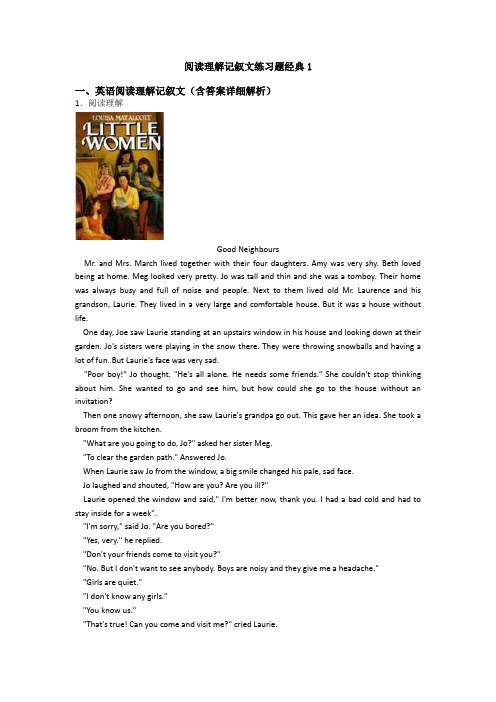
阅读理解记叙文练习题经典1一、英语阅读理解记叙文(含答案详细解析)1.阅读理解Good NeighboursMr. and Mrs. March lived together with their four daughters. Amy was very shy. Beth loved being at home. Meg looked very pretty. Jo was tall and thin and she was a tomboy. Their home was always busy and full of noise and people. Next to them lived old Mr. Laurence and his grandson, Laurie. They lived in a very large and comfortable house. But it was a house without life.One day, Joe saw Laurie standing at an upstairs window in his house and looking down at their garden. Jo's sisters were playing in the snow there. They were throwing snowballs and having a lot of fun. But Laurie's face was very sad."Poor boy!" Jo thought. "He's all alone. He needs some friends." She couldn't stop thinking about him. She wanted to go and see him, but how could she go to the house without an invitation?Then one snowy afternoon, she saw Laurie's grandpa go out. This gave her an idea. She took a broom from the kitchen."What are you going to do, Jo?" asked her sister Meg."To clear the garden path." Answered Jo.When Laurie saw Jo from the window, a big smile changed his pale, sad face.Jo laughed and shouted, "How are you? Are you ill?"Laurie opened the window and said," I'm better now, thank you. I had a bad cold and had to stay inside for a week"."I'm sorry," said Jo. "Are you bored?""Yes, very." he replied."Don't your friends come to visit you?""No. But I don't want to see anybody. Boys are noisy and they give me a headache.""Girls are quiet.""I don't know any girls.""You know us.""That's true! Can you come and visit me?" cried Laurie."I'm not quiet, but I'd like to come," replied Jo. "I must ask Mother first." She ran back into her house.A few minutes later, she returned and rang the bell on the door of Laurie's house. A servant took her upstairs."Here I am!" she said brightly. "Mother sends her love and my sisters gave me this blancmange (牛奶冻) for you.""That looks delicious," Laurie said. He was very happy to see Jo.Jo looked around. There were lots of books on the shelves."A nice room!" she said. "I can read to you if you like.""No, let's talk," replied Laurie."All right," said Jo, "I can talk for hours. My sisters say I never know when to stop.""You have three sisters—Amy, Beth and Meg." Laurie continued."How do you know this?" Jo was surprised."You call each other's names when you are in the garden. Sometimes I can see you all around the table with your mother. She has a very kind face. I like looking at her. I haven't got a mother." Jo felt sad when she heard this."Why don't you come and visit us?" she said, "It isn't good for you to stay in this house all the time.""Thank you. I'd like to come very much." Said Laurie."We know all our neighbours except you." Jo said, "I'm glad we're friends now."She told him about all the interesting things in her life. She said," Besides(除了……之外)plays, I also love books." Laurie loved books too, and offered to show her the library in the house. The library was a wonderful room. Jo loved it."Wow!" she said, "All those books!"Laurie said, "A person needs more than books."(Adapted from Little Women)(1)From the first paragraph, we know ________________.A. Jo's family had five membersB. Jo and Laurie were neighboursC. Laurie and his grandpa were busyD. the four sisters had the same hobby(2)Jo wanted to visit Laurie because _________________.A. she wanted to visit his large houseB. Laurie invited her to play with snowballsC. she felt he was lonely and needed friendsD. Laurie was seriously ill and needed her care(3)What might be the correct order of what happened in the story?a. Jo saw Laurie standing at an upstairs window in his house.b. Jo and Laurie were having a talk happily at Laurie's home.c. Jo wanted to Laurie's home after telling her mother.d. Jo couldn't stop thinking about Laurie.A. a—b—c—dB. b—a—c—dC. b—d—a—cD. a—d—c—b(4)Which words can best describe Jo and her sisters?A. Kind and friendlyB. Generous but rudeC. Quiet and smartD. Funny but carless (5)What does Laurie mean by saying "A person needs more than books."?A. People need to stay in their own houses.B. People should learn much more from the books.C. People need love and friendship besides books.D. People should relax themselves besides reading【答案】(1)B(2)C(3)D(4)A(5)C【解析】【分析】文章大意:文章讲述了Jo和她的邻居Laurie的故事,Laurie跟着爷爷生活没有了母亲,又生病了,心情很不越快,一天当Jo看到了他之后心里放不下,就找机会接近了他,了解了情况,然后成为了好朋友。
记叙文阅读专题24篇(含答案)

全国中考语文真题分类汇编:记叙文阅读专题(共24篇)目录1.栅栏两边苹果甜 (3)2.天空没有多余的星星 (6)3.木刻猴子(林文义) (8)4.石崖上的枣树(刘成章) (11)5.雪白(王开岭) (14)6.家徽(余华) (17)7.消失的故乡(谢冕) (19)8.寻找(马德) (21)9.地铁客的风格(毕淑敏) (24)10.微尘远,山花近(秦锦屏) (27)11.老师! 老师!(阎连科) (30)12.继父(张亚凌) (32)13.谢谢你,曾经允许我不爱 (35)14.燃烧的木棉(梁惠娣) (38)15.《汉字书法之美》自序(蒋勋) (40)16.守候一株水仙(朱钟洋) (43)17.那些乡间的事物(贾维秀) (46)18.素颜如雪 (48)19.奇怪的西方记者(邓笛) (50)20.雕花烟斗(冯骥才) (53)21.炸豆(阿慧) (55)22.乡村一树寂寞红(杜忠书) (58)23.老汪栗子(明前茶) (61)24.杏荫井台(杨闻宇) (63)1栅栏两边苹果甜①艾尔和胡安住在普韦布洛村村口两幢并排的房子里,尽管他们的房子十分相似,但艾尔家的庭院里有一棵枝繁叶茂的大苹果树,而胡安家却没有。
在艾尔看来,除了家人和好脾气,胡安拥有的东西很少。
②春天,苹果树蓬蓬勃勃地开出满树的粉色花朵;秋天,苹果树的枝头缀满红艳、甜美的果实。
这时,艾尔每天都会对着苹果树吹嘘一番:“我的苹果树开出的花最美丽,结出的果实最甜美,这使我成为普韦布洛村最棒、最幸福的人!”“那的确是棵很美的苹果树。
”胡安赞同地说,“你也让我们一同欣赏它的美丽,我感觉很开心。
”听到别人也从他的苹果树上获取益处,艾尔的幸福减少了一大半。
他越想越不高兴,为了独享苹果树恩赐的幸福,他悄悄地建造了一道高高的栅栏。
③尽管如此,有一年春天,艾尔还是沮丧地看到,苹果树的一根枝条已悄悄伸进了邻居家的庭院。
艾尔想:“我不能剪掉它,秋天它还会结出很多的苹果呢。
新部编中考 语文专题复习记叙文阅读专题训练训练含解析

新部编中考语文专题复习记叙文阅读专题训练训练含解析一、中考语文记叙文阅读专题训练1.记叙文阅读家之脉陈忠实①1950年春节过后的一天晚上,在那盏祖传的清油灯下,父亲把一只毛笔和一沓黄色仿纸交到我手里:“你明日早起去上学。
”我拔掉竹筒笔帽儿,看见一撮黑里透黄的动物毛做成的笔头。
父亲又说:“你跟你哥合用一只砚台。
”②我的3个孩子的上学日,是我们家的庆典日。
在我看来,孩子走进学校的第一步,认识的第一个字,用铅笔写成的汉字第一画,才是孩子生命中光明的开启。
他们从这一刻开始告别黑暗,踏上智慧人生的征程。
③我们家木楼上有一只破旧的大木箱,乱扔着一堆书。
我看着那些发黄的纸和一行行栗子大的字问父亲:“是你读过的书吗?”父亲说是他读过的,随之加重语气解释说:“那是你爷爷用毛笔抄写的。
”我大为惊讶,原以为是石印的,毛笔字怎么写到和我的课本上的字一样规矩呢?父亲说:“你爷爷是先生,当先生先得写好字,字是人的门脸。
”在我出生之前已谢世的爷爷会写一手好字,我最初的崇拜产生了。
④父亲的毛笔字显然比不得爷爷,然而父亲会写字。
大年三十的后晌,村人夹着一卷红纸走进院来,父亲磨墨、裁纸,为乡亲写好新春对联,摊在明厅里的地上晾干。
我瞅着那些大字不识一个的村人围观父亲舞笔弄墨的情景,隐隐感到了一种难以言说的自豪。
⑤多年以后,我从城市躲回祖居的老屋,在准备和写作《白鹿原》的6年时间里,每到春节前一天后晌,为村人继续写迎春对联。
每当造房上大梁或婚丧大事时,村人就来找我写对联。
这当儿我就想起父亲写春联的情景,也想到爷爷手抄给父亲的那一厚册课本。
⑥我的儿女都读进大学,学历比我高了,更比我的父亲和爷爷高了(他们都没有任何文凭,我只是高中毕业)。
然而儿女唯一不及父辈和爷辈的便是写字,他们一律提不起毛笔来。
村人们再不会夹着红纸走进我家屋院了。
⑦13岁那年,礼拜五晚上一场大雪,足足下了一尺厚。
第二天上课心里都在发慌,50余里路程步行,怎么回家去背馍呢?最后一节课上完,我走出教室门时就愣住了,父亲披一身一头的雪迎着我走过来,肩头扛着一口袋馍馍,笑吟吟地说:“我给你把干粮送来了,这个星期你不要回家了,你走不动,雪太厚了……”⑧二女儿因为读俄语,只好赶到高陵县一所开设俄语班的中学去补习。
04记叙文阅读之散文15篇50题-2024年中考语文复习记叙文阅读最新试题精选(多省市)(原卷版)

备战2024年中考语文复习记叙文阅读最新试题精选04 记叙文阅读之散文15篇50题(北京专用)(2023·北京朝阳·二模)阅读《梅岭之恋》,完成下面小题。
梅岭之恋①想念梅岭已久。
②最早的想念,始于50多年前的中学时代,读过了陈毅的《梅岭三章》后。
梅岭,便幻化成我向往的意象。
梅岭古道,特别是梅岭关楼那面巨石上雕刻的“梅岭”两个红色大字,如一面旌旗,常会浮现在眼前,随风猎猎飘动。
③四年前,我曾经由梅岭山脚隧道去江西。
只见隧道这边密布阴云,风雨大作,隧道另一端却阳光灿烂,仿佛什么都没有发生。
此刻我脑中不禁浮现一句古诗“八面风来山镇定”,梅岭阅尽春秋,淡然自若。
④今年初冬,我终于登上了梅岭。
山间阴云四合,岭南漫山草木的绿色,显得格外深沉浓郁,不似江南烟雨中的草木那般水嫩轻浮。
梅岭是一部大书,而非一首小诗。
登梅岭,不像登别处的山,你不是来游玩观赏风景的,而是来参拜历史和英雄的。
⑤出现在眼前的古道,让我一步跌入前朝——那种鹅卵石铺就的斑驳古道,虽然经过了整修,却依然存有古迹古风,千年风雨的侵袭所留下的悠久岁月的皱褶,是历史镌刻下的印迹。
【甲】这条蜿蜒向上的古道,仿佛可以一直通向天上,也可以通向历史的深处。
这条古道,如一部宏大的乐章,乐章中的华彩部分,就是梅岭的关楼。
⑥慢慢地爬,不要着急一下子就看到关楼。
心里忽然有点儿像晚年的音乐家柏辽兹,千里迢迢赶去见年轻时的恋人一般,虽然明知她已经苍老,却依然心里充满激动,充满期待,按捺不住急迫的心情,却不由得放慢了脚步。
在幽幽古道中前行,仿若在历史长河中穿行,梅岭的英雄走入脑海。
⑦梅岭英雄,最早的一位要数唐代的张九龄。
如果不是他向唐玄宗谏言开凿梅岭古道,我们便不会有这样的机会与历史邂逅。
位于大庾岭的梅岭,界分广东和江西,它海拔不高,却地势险峻,以那时的条件开凿这样一条山道,可以想象有多么艰难。
清代诗人杭世骏曾写下这样的诗句:“荒祠一拜张丞相,疏凿真能迈禹功。
初中语文阅读理解专项训练题及解析

初中语文阅读理解专项训练题及解析阅读理解是初中语文学习中的重要部分,它不仅考查学生对文字的理解能力,还考验学生的分析、归纳和推理能力。
以下为大家提供一些专项训练题及详细解析,希望能对同学们的学习有所帮助。
一、记叙文阅读(一)阅读下面的文章,完成 1 4 题。
《父亲的自行车》①有人说,十岁的小孩子崇拜父亲,二十岁的青年人鄙视父亲,四十岁的中年人怜悯父亲。
然而,对我来说,这个世界上父亲是唯一值得一辈子崇拜的人。
②父亲是建筑师,工地上所有的工人都怕他,沙子与水泥的比例有一点儿差错也会招来父亲的痛斥。
然而,父亲在家里永远是慈爱的,他的好脾气甚至超过了母亲。
在县城里,父亲的自行车人人皆知,每天早晚,他风雨无阻地骑着吱吱嘎嘎的破车接送我和弟弟上下学。
那时,我和弟弟总手拉着手跑出校门,一眼就看见站在破自行车旁,穿着旧蓝色中山服焦急地张望着的父亲。
③一路上,两个小家伙叽叽喳喳地说个不停,而父亲一直能一心两用,一边乐滋滋地听着,一边小心翼翼地避过路上数不清的坑坑洼洼。
等到我上了初中,父亲的车上便少了一个孩子;等到弟弟也上了初中,父亲便省去了一天两趟的奔波。
可父亲似乎有些怅然若失,儿子毕竟一天天长大了。
④收到大学录取通知书的那天,我兴奋得睡不着觉。
半夜里听见客厅里有动静,起床看,原来是父亲,他正在台灯下翻看一本发黄的相簿。
看见我,父亲微微一笑,指着一张打篮球的照片说:“这是我刚上大学时照的!”照片上,父亲生龙活虎,眼睛炯炯有神,好一个英俊的小伙子!此刻,站在父亲身后的我却蓦然发现,父亲的脑后已有好些白发了。
⑤父亲一次又一次地将我送上了离家的汽车。
当时,没有一个父母不希望自己的孩子留在身边的,可是父亲却狠下心来,坚持送我到千里之外的大学。
我知道,父亲是在用他的行动告诉我:一个人,要志在四方。
⑥第一次从省城回家,走出车站,老远就看见父亲推着那辆破自行车来接我。
我向父亲跑去,父亲将我紧紧地搂在怀里。
我发现,父亲的脸上多了几道皱纹,眼睛里也布满了血丝。
06记叙文阅读之散文15篇60题-2024年中考语文复习记叙文阅读最新试题精选(多省市)(原卷版)
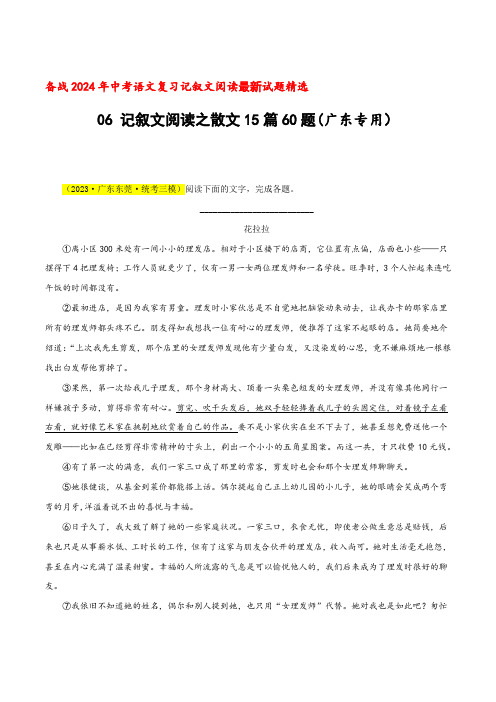
备战2024年中考语文复习记叙文阅读最新试题精选06 记叙文阅读之散文15篇60题(广东专用)(2023·广东东莞·统考三模)阅读下面的文字,完成各题。
__________________________花拉拉①离小区300米处有一间小小的理发店。
相对于小区楼下的店商,它位置有点偏,店面也小些——只摆得下4把理发椅;工作人员就更少了,仅有一男一女两位理发师和一名学徒。
旺季时,3个人忙起来连吃午饭的时间都没有。
②最初进店,是因为我家有男童。
理发时小家伙总是不自觉地把脑袋动来动去,让我办卡的那家店里所有的理发师都头疼不已。
朋友得知我想找一位有耐心的理发师,便推荐了这家不起眼的店。
她简要地介绍道:“上次我先生剪发,那个店里的女理发师发现他有少量白发,又没染发的心思,竟不嫌麻烦地一根根找出白发帮他剪掉了。
③果然,第一次给我儿子理发,那个身材高大、顶着一头栗色短发的女理发师,并没有像其他同行一样嫌孩子多动,剪得非常有耐心。
剪完、吹干头发后,她双手轻轻捧着我儿子的头固定住,对着镜子左看右看,就好像艺术家在挑剔地欣赏着自己的作品。
要不是小家伙实在坐不下去了,她甚至想免费送他一个发雕——比如在已经剪得非常精神的寸头上,剃出一个小小的五角星图案。
而这一共,才只收费10元钱。
④有了第一次的满意,我们一家三口成了那里的常客,剪发时也会和那个女理发师聊聊天。
⑤她很健谈,从基金到菜价都能搭上话。
偶尔提起自己正上幼儿园的小儿子,她的眼睛会笑成两个弯弯的月牙,洋溢着说不出的喜悦与幸福。
⑥日子久了,我大致了解了她的一些家庭状况。
一家三口,衣食无忧,即使老公做生意总是赔钱,后来也只是从事薪水低、工时长的工作,但有了这家与朋友合伙开的理发店,收入尚可。
她对生活毫无抱怨,甚至在内心充满了温柔甜蜜。
幸福的人所流露的气息是可以愉悦他人的,我们后来成为了理发时很好的聊友。
⑦我依旧不知道她的姓名,偶尔和别人提到她,也只用“女理发师”代替。
- 1、下载文档前请自行甄别文档内容的完整性,平台不提供额外的编辑、内容补充、找答案等附加服务。
- 2、"仅部分预览"的文档,不可在线预览部分如存在完整性等问题,可反馈申请退款(可完整预览的文档不适用该条件!)。
- 3、如文档侵犯您的权益,请联系客服反馈,我们会尽快为您处理(人工客服工作时间:9:00-18:30)。
阅读理解记叙文总复习经典例题、习题经典一、英语阅读理解记叙文(含答案详细解析)1.阅读下列材料,从A、B、C、D四个选项中选出最佳答案。
A young woman traveled and stayed in a hotel. All the rooms in the hotel were singles(单人间). So she lived in a single room.Just when she was going to bed, there was a knock at the door. She had no friends in the city. So she was quite surprised but still opened the door.The man who was standing at the door looked a little nervous. "Oh! I'm sorry. I thought this was my room," the man said and walked away in a hurry.The woman called the police at once. Soon, the man was caught. He was a thief(小偷)! But how did the woman know that?All the rooms in the hotel were singles. Who would knock at his own door if he was staying alone? Only a thief would do this. He wanted to see if anyone was inside before he broke into the room.(1)A young woman traveled and stayed ____.A. in a hotelB. in a police officeC. in a parkD. in her friend's home(2)The man looked a little ____ when the woman opened the door.A. happyB. nervousC. madD. relaxed(3)The man knocked at the door to ____.A. find his friend in the cityB. stay aloneC. see if anyone was insideD. call the police【答案】(1)A(2)B(3)C【解析】【分析】文章大意:一位年轻女士住在宾馆时,有人敲门询问这是不是他的房间,这位女士断定他是一个小偷,并报了警。
(1)细节理解题。
根据文中的语句 A young woman traveled and stayed in a hotel. 理解可知,这位年轻的女士住在了宾馆,故选A。
(2)细节理解题。
根据文中的语句 The man who was standing at the door looked a little nervous. 理解可知,这个年轻人看到这位女士非常的紧张,故选B。
(3)细节理解题。
根据文中的语句Only a thief would do this. He wanted to see if anyone was inside before he broke into the room.可知,这个人敲门的主要目的就是看看房间里有没有人,故选C。
【点评】考查阅读理解。
本文主要考查细节理解题,首先仔细阅读文后的问题,弄清问题的大意;然后带着问题阅读短文,抓住关键信息,选择正确答案。
2.阅读短文,从各题所给的A、B、C、D四个选项中选出最佳选项。
By Anna Matteo28 January, 2019A 3-year-old boy who was lost in the woods for two days is now safe at home with his family.But Casey Hathaway told his rescuers (救援者)that he was not alone in the rainy, freezing cold woods. He said he was with a friend — a bear.The child went missing on January 22 while playing with friends near his grandmother's house in North Carolina. When the other children returned but Casey did not, the family searched the area for almost an hour before calling the police.Police formed a search team to look for the young boy in the nearby woods. But two days went by and—no Casey.Then on January 24, someone called the police saying he heard a child crying in the woods. Police followed up on the information and found Casey at about 9:30 that night. He was in good health.Casey told the rescuers he had hung out with a black bear for two days, a bear he called his "friend".The police officer Chip Hughes spoke with reporters from several news agencies. He said Casey did not say how he could survive in the woods for two days in the cold, rainy weather. "However," the police officer said, "he did say he had a friend in the woods that was a bear with him."Hundreds of people helped in the search and rescue efforts, including some 600 volunteers, police and members of the army. Doctors at the medical center gave Casey some examination. He was then sent to his family on January 25.His mother talked with reporters and thanked everyone who joined the search for her son. "We just want to tell everybody that we're very thankful that you took the time out to search for Casey," said his mother. "He is up and talking He's already asked to watch cartoons."(1)Who stayed with Casey in the woods during the two days?A. A bear.B. The police.C. His mother.D. The volunteers.(2)The underlined word "survive" in Paragraph 6 probably means " ▲ ".A. give upB. get lostC. fall asleepD. remain alive(3)What is the correct order in which these happen?a. Someone heard a child crying.b. The family started to look for Casey.c. Casey played with his friends.d. The police found Casey was in good health.A. b-c-a-dB. b-c-d-aC. c-b-a-dD. c-b-d-a(4)After Casey was sent back home, he was ________.A. scaredB. nervousC. relaxedD. surprised【答案】(1)A(2)D(3)C(4)C【解析】【分析】文章大意:文章讲述了三岁的孩子 Casey Hathaway 在丢失之后的神奇的经历。
他跟一只大熊游逛了两天。
(1)细节理解题,根据 He said he was with a friend a bear. 可知他跟一只熊在一起,故答案是A。
(2)词义猜测题题,小男孩丢失了,根据in the woods for two days in the cold, rainy weather,这些都是小男孩在森林里遇到的恶劣生存条件,小男孩最后安全回家,可推测该单词的意思是生存,故答案是D。
(3)细节排除题,根据文章内容可知,孩子跟朋友在一起玩,即c,没有回来,家人就开始找他,即b。
然后就有人听到了孩子的哭喊声即a,最后警察发现他状况很好,即d,句子顺序应该是c-b-a-d,故答案是C。
(4)细节理解题,根据 He is up and talking He's already asked to watch cartoons,可知说明孩子没有问题,很放松,故答案是C。
